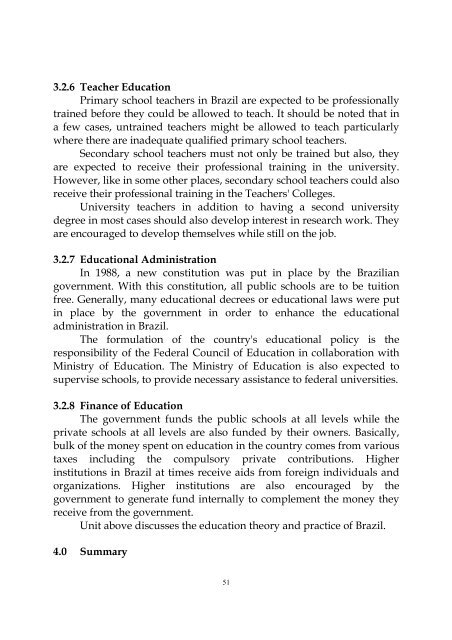edu 304 - comparative education - National Open University of Nigeria
edu 304 - comparative education - National Open University of Nigeria
edu 304 - comparative education - National Open University of Nigeria
Create successful ePaper yourself
Turn your PDF publications into a flip-book with our unique Google optimized e-Paper software.
3.2.6 Teacher Education<br />
Primary school teachers in Brazil are expected to be pr<strong>of</strong>essionally<br />
trained before they could be allowed to teach. It should be noted that in<br />
a few cases, untrained teachers might be allowed to teach particularly<br />
where there are inadequate qualified primary school teachers.<br />
Secondary school teachers must not only be trained but also, they<br />
are expected to receive their pr<strong>of</strong>essional training in the university.<br />
However, like in some other places, secondary school teachers could also<br />
receive their pr<strong>of</strong>essional training in the Teachers' Colleges.<br />
<strong>University</strong> teachers in addition to having a second university<br />
degree in most cases should also develop interest in research work. They<br />
are encouraged to develop themselves while still on the job.<br />
3.2.7 Educational Administration<br />
In 1988, a new constitution was put in place by the Brazilian<br />
government. With this constitution, all public schools are to be tuition<br />
free. Generally, many <strong>edu</strong>cational decrees or <strong>edu</strong>cational laws were put<br />
in place by the government in order to enhance the <strong>edu</strong>cational<br />
administration in Brazil.<br />
The formulation <strong>of</strong> the country's <strong>edu</strong>cational policy is the<br />
responsibility <strong>of</strong> the Federal Council <strong>of</strong> Education in collaboration with<br />
Ministry <strong>of</strong> Education. The Ministry <strong>of</strong> Education is also expected to<br />
supervise schools, to provide necessary assistance to federal universities.<br />
3.2.8 Finance <strong>of</strong> Education<br />
The government funds the public schools at all levels while the<br />
private schools at all levels are also funded by their owners. Basically,<br />
bulk <strong>of</strong> the money spent on <strong>edu</strong>cation in the country comes from various<br />
taxes including the compulsory private contributions. Higher<br />
institutions in Brazil at times receive aids from foreign individuals and<br />
organizations. Higher institutions are also encouraged by the<br />
government to generate fund internally to complement the money they<br />
receive from the government.<br />
Unit above discusses the <strong>edu</strong>cation theory and practice <strong>of</strong> Brazil.<br />
4.0 Summary<br />
51
















